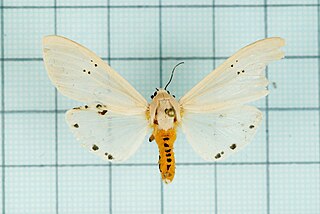
The Noctuidae, commonly known as owlet moths, cutworms or armyworms, are a family of moths. They are considered the most controversial family in the superfamily Noctuoidea because many of the clades are constantly changing, along with the other families of the Noctuoidea. It was considered the largest family in Lepidoptera for a long time, but after regrouping Lymantriinae, Catocalinae and Calpinae within the family Erebidae, the latter holds this title now. Currently, Noctuidae is the second largest family in Noctuoidea, with about 1,089 genera and 11,772 species. This classification is still contingent, as more changes continue to appear between Noctuidae and Erebidae.
Camptoloma is a genus of moths in the family Nolidae. It was formerly incorrectly placed in Arctiidae.
Eccrita is a genus of moths of the family Noctuidae and is in the subfamily of Calpinae. The genus was erected by Julius Lederer in 1857. The genus was considered a synonym of Lygephila by Robert W. Poole, but it was revalidated by Herbert Beck in 1996.

Lygephila is a genus of moths in the family Erebidae. The genus was erected by Gustaf Johan Billberg in 1820.
Toxocampa is a genus of moths of the family Noctuidae. The genus was erected by Achille Guenée in 1841. Lepidoptera and Some Other Life Forms and The Global Lepidoptera Names Index describe this name as a synonym of Lygephila.

Lygephila lusoria is a moth of the family Erebidae. The species was first described by Carl Linnaeus in his 1758 10th edition of Systema Naturae. It is found in southern Europe, the Near East and Middle East, European south-eastern Russia, the Caucasus, Turkey and Israel.
Camptoloma kishidai is a moth of the subfamily Arctiinae. It is endemic to Guangdong in China.
Parachrostia is a genus of moths of the family Erebidae erected by Michael Fibiger in 2008.

Lygephila viciae is a moth of the family Erebidae. It is found in most of Europe.

Creatonotos transiens is a moth of the family Erebidae. The species was first described in Western literature by Francis Walker in 1855.
Lygephila yoshimotoi is a moth of the family Erebidae. It is found in Taiwan.

Trichopterigia kishidai is a species of moth of the family Geometridae first described by Yazaki in 1987. It is found in Taiwan.

Dindica kishidai is a moth of the family Geometridae first described by Hiroshi Inoue in 1986. It is found in Taiwan.

Lygephila amasina is a moth of the family Erebidae first described by Otto Staudinger in 1878. It is found in Turkey, Lebanon and Israel.
The Toxocampinae are a subfamily of moths in the family Erebidae. Moths in the subfamily typically have a primitive form of genital claspers similar to those of some subfamilies of the Noctuidae.
Psidopala kishidai is a moth in the family Drepanidae. It was described by Yoshimoto in 1987. It is found in Taiwan.

Lygephila victoria is a species of moth in the family Erebidae. It is found in North America.
Lygephila dorsigera is a moth of the family Erebidae first described by Francis Walker in 1865. It is found in Sri Lanka and Taiwan.

Vladimir Viktorovich Dubatolov is a Russian entomologist, lepidopterist, Doctor of Biological Sciences, full member of the Russian Entomological Society, member of the European Lepidopterological Society, curator of the insect collection of the Siberian Zoological Museum, leading researcher at the Institute of Systematics and Ecology of Animals SB RAS (Novosibirsk), leading researcher of the Federal State Budgetary Institution "Zapovednoye Priamurye" (Khabarovsk).










